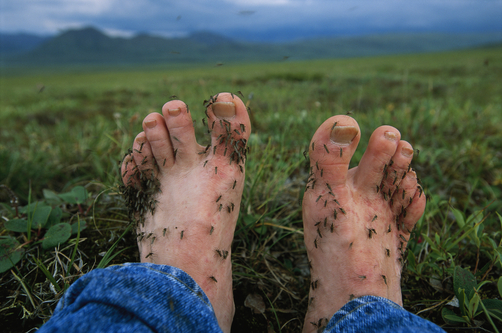
Mosquitoes and other biting insects are attracted to the carbon dioxide emitted from our breath and skin. Certain blood types tend to attract a greater share of mosquitoes. If you are Type O, you likely get more than your fair share of insect bites. Type A gets the fewest.
This reasoning explains my hiking partner and me perfectly. One of us is a Type O, and the other is Type A. When standing in the same area, poor Type O is covered in a halo of bloodsucking mosquitoes while Type A merrily observes the fate of the other. How do those little flying savages know the difference?
Research shows that mosquitos may be able to sense the saccharides that people secrete from the skin based on different blood types and use this information to select their preferred victim.
“85 percent of people secrete a chemical signal through their skin that indicates which blood type they have, while 15 percent do not, and mosquitoes are more attracted to secretors than nonsecretors regardless of which type they are.”
So chances are, you are a secretor. And if you secrete Blood type O, you’ll need extra help repelling insects.
What to Look for in a Bug Spray
Insect repellent should do what it says – repel insects. That includes all the blood-sucking carnivores that frequent us outdoors, including mosquitoes, black flies, no-see-ums, fleas, midges, ticks, and chiggers. All bug sprays (natural and synthetic) contain a proprietary formulation to mask our scent of carbon dioxide and, therefore, our blood as a food source. Several choices of repellents are proven to work. The most familiar one is DEET, so we’ll look at this one first.
DEET
DEET is marketed as the gold standard, so it is the active ingredient in the most effective synthetic insect-repellent formulations. It offers long-lasting protection in the most severe conditions — think of the swampy conditions of the Florida Everglades or the Appalachian Trail in the peak of summer. DEET is highly effective against these biting insects, making it the top choice bug spray for hikers. However, DEET is not the best choice if you are concerned about chemicals and toxicity.
What is DEET?
Deet is a pesticide with the chemical name N, N-diethyl-meta-toluamide. It is a member of the toluene chemical family, a volatile petrochemical solvent found in paint thinners. The EPA classifies this chemical as a Group D carcinogen and Category 3 toxicity (slightly toxic). When used correctly and at lower concentrations, DEET is considered safe (according to the U.S. government).
Use caution, nonetheless.
The percentage of DEET in most insect repellents varies from 20 to 40 percent, with the higher concentrations tending to provide a more effective level of protection for a longer duration. However, anything above 30 percent (as well as long-term use) can cause adverse reactions. Also, higher concentrations of DEET (above 50%) offer no added insecticidal benefit. DEET’s duration of effectiveness plateaus at concentrations higher than 50 percent, explaining why higher levels are hard to find. If you choose DEET, look for concentrations of 30% or less.
Regardless of the dosage, DEET should be treated as a hazardous chemical.
- It can cause reactions to the skin and neurological system. DEET is quickly absorbed into the bloodstream through application to the skin (absorption from 20 to 80 percent), and while many people can use it without incident, others experience severe side effects. It is linked to causing seizures in children. Long-term use in adults is linked to impaired cognitive function, insomnia, and mood disturbances.
- DEET is a solvent and can dissolve plastics and synthetic fabrics. Unfortunately, this includes the synthetic, moisture-wicking clothing backpackers typically wear, such as polyester, nylon, and spandex, as well as backpacking gear, including sunglasses, tents, canopies, sleeping bags, camera cases, and backpacks. If DEET can dissolve plastics, what happens when it absorbs into the skin?
DEET health risks at-a-glance:
Keep in mind that “Not documented” does not mean “Not tested.”
- Neurotoxicity: Yes
- Kidney/Liver Damage: Yes
- Sensitizer/Irritant: Yes
- Birth/Developmental Defects: Yes
- Detected in Groundwater: Yes
- Potential Leecher: Yes
- Cancer: Not documented
- Endocrine Disruption: Not documented
- Reproductive Effects: Not documented
- Toxic to Birds: Not documented
- Toxic to Fish/Aquatic Organisms: Not documented
- Toxic to Bees: Not documented
[source: Beyond Pesticides]
Bug Spray that destroys gear and brain cells are two sensible reasons to avoid any formulations of DEET. If you choose to use DEET anyway, keep it to 30% or less.
Deet’s Nasty Alternative: Permethrin
Permethrin is a synthetic alternative to DEET and is more toxic. It is fatal to fish and many animals, including cats. It is a possible carcinogen and a suspected endocrine disruptor in humans. If you ever see “Buzz Away” or “Insect Repelling” clothing, be advised that it is often impregnated with synthetic permethrin.
- If there is a choice between using Permethrin and DEET, choose DEET.
There are many effective, less toxic insect repellents available. Let’s take a look at some of the options –
Deet’s Honorable Alternative: Picaridin
Picaridin (KBR 3023), also called Icardin and Bayrepel, is a member of the piperidine chemical family. Piperidine is derived from black pepper and is a newer repellent registered with the EPA. Piperidine is a widely used building block for the manufacture of various organic compounds, including chemicals, pharmaceuticals, and narcotic drugs — such as PCP.
Picaridin is odorless and a highly effective insect repellent. The CDC reports that Picaridin provides comparable protection to DEET at lower concentrations (about 20%). And unlike DEET, picaridin is odorless and does not dissolve plastics or synthetics.
There is one possible concern with picaridin: it is new. Not enough time has passed to collect information on long-term health risks (should they exist). Also, repellents containing picaridin are limited due to its newness.
- If you are looking for a non-odorous repellent that offers long-lasting, effective protection similar to DEET, without dissolving backpacking gear, look for formulations that include Picaridin (10% to 20% concentrations).
- If there is a choice between using Picaridin and DEET, choose Picaridin.
Picaridin Insect Spray Brands:
Cutter Advanced, Repel Smart Spray, Sawyer Premium
Deet’s Other Alternative: IR3535
Another synthetic alternative to DEET is IR3535, developed by Merck & Co. IR3535, 3-[N-Butyl-N-acetyl]-amino propionic acid, ethyl ester is structurally related to beta-alanine. This amino acid occurs naturally in the environment.
IR3535 offers similar effectiveness to DEET at similar concentrations; however, like DEET, it dissolves plastics. It also needs to be reapplied more frequently than DEET. IR3535 has been used as an insect repellent in Europe for 20 years with no substantial adverse effects. In the U.S., you can find it in Avon insect repellents.
- If there is a choice between using IR3535 and DEET, choose IR3535.
IR3535 Insect Spray Brands:
Avon Skin-So-Soft Bug Guard PLUS IR3535, Avon Expedition Series
Natural Mosquito Repellents
Plant-based repellents can provide fantastic insecticidal properties that are safe for skin. Some of these botanicals are more potent than others. Many commercial herbal insect sprays contain a fixative agent, such as soy or coconut oil, to extend the duration of the essential oil and make it easier to apply. If it contains soy oil, ensure it is non-GMO or organic. Also, be sure to read what the “inert” ingredients are, which often make up the largest portion of the product. Sometimes the inert ingredients are not disclosed. In that case, put it back because it is likely something you don’t want to be applied to your skin.
Botanical Insect Sprays: Effective Options
Lemon Eucalyptus Oil comes from the leaves of the Eucalyptus citridora tree. It is the only plant-based repellent
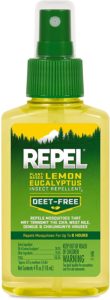 registered with the EPA and recommended by the CDC to repel mosquitoes carrying West Nile. In two recent scientific publications, when the oil of lemon eucalyptus was tested against mosquitoes found in the U.S., it provided protection similar to repellents with low concentrations of DEET. Specifically, it repels biting insects for up to six hours. Products that feature Lemon Eucalyptus as the active ingredient are ideal for backpackers looking for a truly effective insect repellent made from renewable, natural resources. Concentrations of 30% or higher are most effective.
registered with the EPA and recommended by the CDC to repel mosquitoes carrying West Nile. In two recent scientific publications, when the oil of lemon eucalyptus was tested against mosquitoes found in the U.S., it provided protection similar to repellents with low concentrations of DEET. Specifically, it repels biting insects for up to six hours. Products that feature Lemon Eucalyptus as the active ingredient are ideal for backpackers looking for a truly effective insect repellent made from renewable, natural resources. Concentrations of 30% or higher are most effective.
Botanical (Lemon Eucalyptus) Insect Spray Brands:
Repel Lemon Eucalyptus, Cutter Lemon Eucalyptus
Geranium oil or Geraniol is a highly effective plant-based mosquito repellent, but it can attract bees. It is produced by the same flowers that honey bees are attracted to for nectar.
Botanical (Geranium) Insect Spray Brands:
Bite Blocker Xtreme, Quantum Buzzaway Extreme
Neem oil is a plant-based repellent containing natural insecticidal compounds called azadirachtins. It is an extract from the neem tree, a tropical evergreen (part of the mahogany family) native to India. According to scientists at the Malaria Institute in India, Neem oil was superior to repellents containing DEET. Their findings were confirmed by the Journal of the Mosquito Control Association and the National Research Council. Neem oil is used extensively in Ayurvedic medicine for many skin issues. It has antiviral, antibacterial, and anti-fungal properties as well. The one caveat of neem is that it has a powerful odor that is not pleasant. Look for sprays that are mixed with a more pleasing scented essential oil.
Botanical (Neem) Insect Spray Brands:
TheraNeem Outdoor Herbal Spray

Thyme oil – In one study, carvacrol and alpha-terpinene, two compounds derived from the essential oil of thyme, were found to have significantly greater repellency than a commercial DEET repellent. The researchers suggest that a spray made with 2% alpha-terpinene is a promising natural mosquito repellent. However, don’t try to make a thyme oil-repellent at home – it is too irritating and strong-smelling at concentrations above 25%.
Clove oil – Two studies have found that undiluted topical clove oil is active against mosquitoes. However, like thyme oil, clove oil should not be applied undiluted to the skin as a homemade repellent.
Other Natural Tips
Bug Net – In some areas, gnats and mosquitoes are prolific, and insect spray will never be enough. The bugs will fly straight into your ears and eyes and cause misery. In that case, your best alternative is to cover up with a mesh face covering or a full bodysuit.
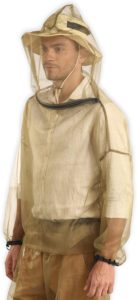
Catnip oil – might be the right choice if you love cats and hate mosquitoes. Nepetalactone is the substance extracted from the catnip plant that repels biting insects. Iowa State University researchers found that catnip essential oil is 10 times more effective than DEET at repelling mosquitoes. DuPont has recently received registration from the U.S. Environmental Protection Agency (EPA) for using this ingredient as an insect repellent. Catnip repellent may soon be available for retail sale.
Mosquito Repellent phone app – if you don’t want to spray your body with smelly or sticky sprays, try running a mosquito app. There are several applications you can download on your phone for free. These apps work by emitting a low-frequency tone that insects avoid when heard (undetectable to the human ear). Interestingly, dragonflies are a major predator of mosquitoes, and when in flight, their wings generate a similar vibrational sound that mosquitoes know to avoid. I have no experience using these apps, but it might be worthwhile to try.
 Facts you didn’t know about Mosquitoes
Facts you didn’t know about Mosquitoes
Biting insects can detect you from up to 100 feet away. They find you based on the levels of carbon dioxide and lactic acid you excrete through your breath and sweat. Mosquitoes are attracted to some people more than others. Besides blood type, mosquitoes are attracted to people with a larger body mass, higher body temperature, heavy sweaters, and those that excrete higher rates of lactic acid (which builds up when muscles are exerted). Research has also shown they prefer landing on darker fabrics rather than light ones, so stay away from black or blue clothing– especially if you are big and secrete blood type O.
The females are the bloodsuckers. Females do not bite for food but to fertilize eggs. Male mosquitoes do not bite; they eat plain plant juices and nectar.
Mind Your Location
Keep in mind that insect protection depends on your location. Mosquitoes in the U.S. can carry West Nile or Encephalitis. Ticks can spread Lyme disease, Babesiosis, and Rocky Mountain spotted fever. Outside the U.S., you might encounter mosquitoes carrying malaria, yellow fever, or dengue fever. No single repellent will work across all geographic areas.
Sources for this article:
Agency for Toxic Substances and Disease Registry – http://www.atsdr.cdc.gov/consultations/deet/health-effects.html
DEET Factsheet – EPA http://www.epa.gov/oppsrrd1/REDs/factsheets/0002fact.pdf
DEET Factsheet – NCAP http://www.pesticide.org/get-the-facts/pesticide-factsheets/factsheets/deet
DEET Registration – EPA http://www.epa.gov/opp00001/chem_search/reg_actions/reregistration/fs_PC-080301_1-Apr-98.pdf
DEET Hazards – Beyond Pesticides http://www.beyondpesticides.org/resources/pesticide-gateway?pesticideid=23
Picardin Factsheet – EPA http://www.epa.gov/opp00001/chem_search/reg_actions/registration/fs_PC-070705_01-May-05.pdf
IR3535 Registration – http://www.epa.gov/opp00001/chem_search/reg_actions/registration/related_PC-113509_1-Feb-99.pdf
Catnip Oil Registration – EPA http://www.epa.gov/oppbppd1/biopesticides/ingredients/tech_docs/brad_004801.pdf
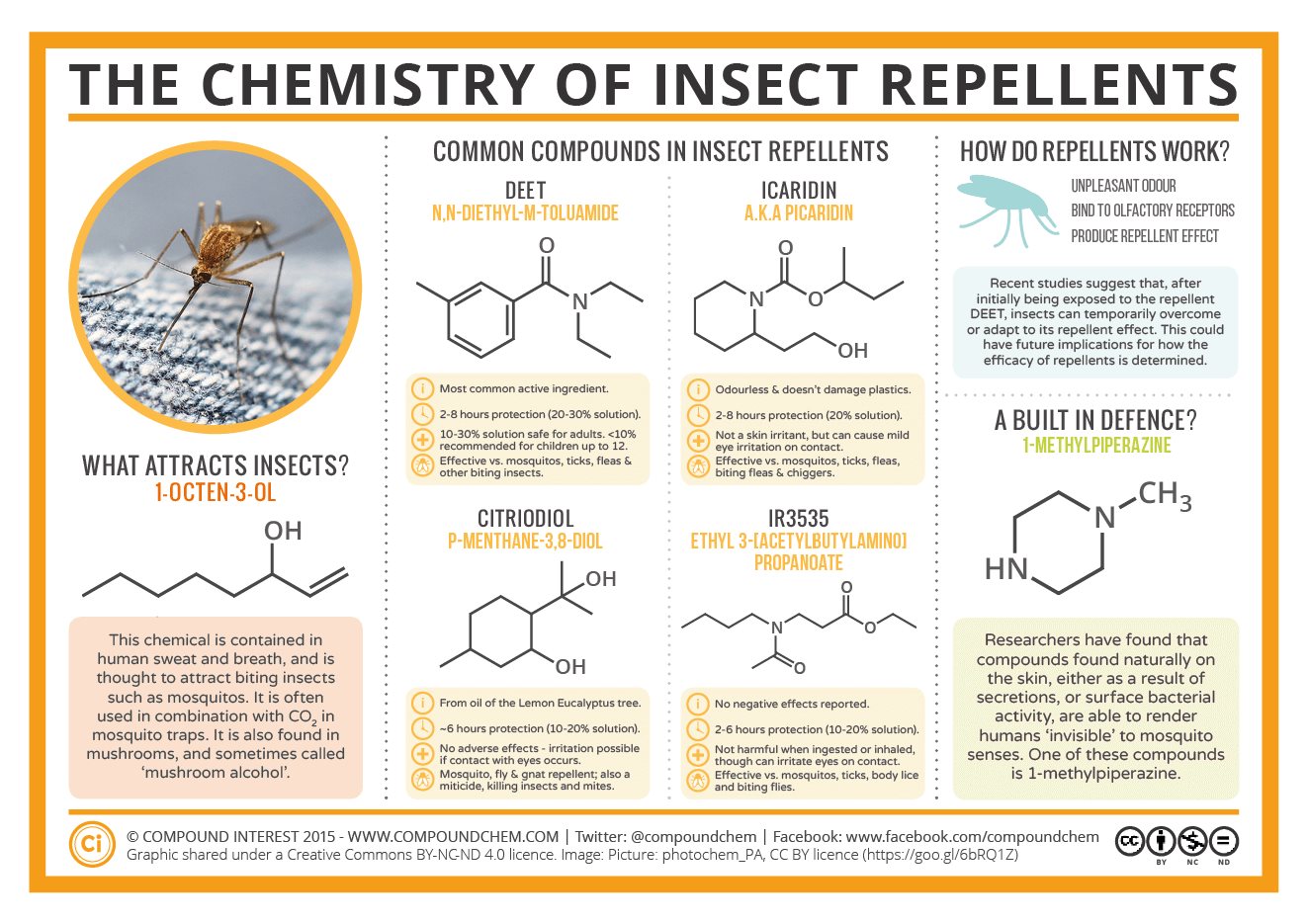
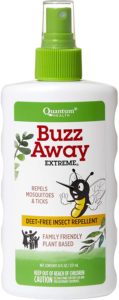
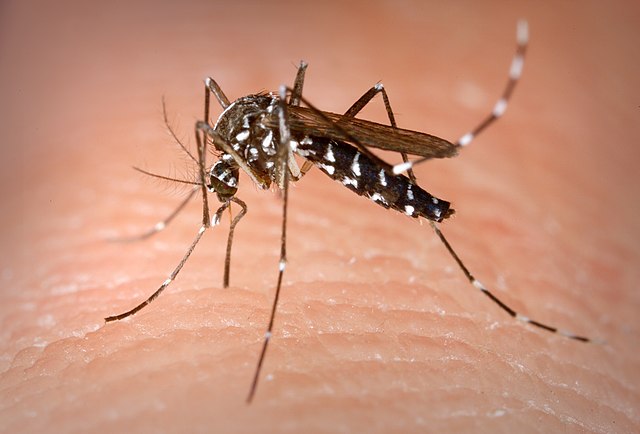 Facts you didn’t know about Mosquitoes
Facts you didn’t know about Mosquitoes